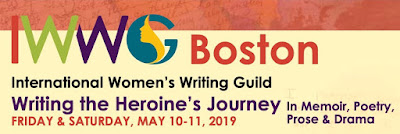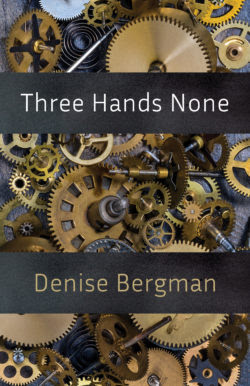The
4th Annual IWWG Boston Area Conference: Writing the
Heroine’s Journey – In Poetry, Prose, Memoir & Drama, will be
held in Medfield, MA, May 10 and 11, 2019
The
International Women’s Writing Guild (IWWG) will host its 4th
Annual Boston area writing conference,
featuring four outstanding IWWG instructors,
on Friday, May 10,
and Saturday, May 11, 2019. The conference offers new and experienced
writers craft insights into writing
memoir, poetry, prose and monologue, and will be held at The
Montrose School, 29 North Street, Medfield, MA from
6:00 p.m. – 9:00 p.m. May 10, and
from 9:30
a.m. – 5:00 p.m. on May 11.
This
year’s conference theme focuses on writing the “heroine’s
journey,” a narrative process developed by author of the
bestselling The Heroine’s Journey,
Maureen Murdock. In 1949, Joseph Campbell presented a model of
the mythological journey of the hero that has since been used as a
template for the psycho-spiritual development of the individual. This
model, however, did not address the task for today's woman, which is
to heal the wounding of the feminine that exists deep within herself
and the culture. Now, more than ever, women are speaking their truth
as the feminine demands healing.
Throughout
the conference, writers will apply insights and themes of The
Heroine's Journey, which redefines the heroic quest for women in
memoir, poetry, prose and drama. Attendees will
experience all four workshops, including: Boston area playwright and
poet, Kelly DuMar, presenting: Voices
of Unsung Heroines - Writing Photo Inspired Monologues for the Stage;
Brooklyn, NY based poet, Vanessa Jimenez
Gabb, presenting How the Political is
Personal: The Heroine Probes Context in Poetry; Geneva,
Switzerland based author Susan Tiberghien, presenting
The Alchemy of Journaling: Emerging
from Darkness as Heroine; and California
based author and Pacifica Graduate Institute faculty member, Maureen
Murdock, presenting The Heroine’s
Journey as a Narrative Structure for Memoir & Myth.
The
conference opens Friday evening with Maureen Murdock’s workshop
exploring the stages in
The Heroine's Journey. As women
claim their voice and name their experience, this workshop will
provide a framework for their voice to be heard. Come prepared to
write your own narrative as a heroine’s journey.
In
Susan Tiberghien’s workshop, The
Alchemy of Journaling,
she asks, why
are we afraid to see ourselves as heroines? Why are we afraid
of the dark? If we enter the dark, we will emerge as heroines:
vibrant, creative, compassionate. We will look at examples from
C.G. Jung, Etty Hillesum, and Marion Woodman. We will see journaling
as alchemy with its three steps: entering the dark, nigredo;
distilling the memory, albedo; polishing the gold, the new
consciousness, rubedo. Through active imagination, we will find
a memory, a dream, an image and take into the dark, we will distill
its meaning, and find its worth.
How
is the Political Personal? Vanessa Jimenez Gabb will invite
participants to think about the ways we can generate poetry based on
the heroine's journey to bring attention to the various systems of
which we are products, privileged, oppressed. We will reflect on and
write our respective journeys through poetry, and share with one
another so that we may realize their collective power.
Kelly
DuMar invites participants to write the voices of unsung heroines.
“You hear them, you see them, you know them – these
women from your families, your personal history, and your community –
but their stories are as yet unwritten,” she says. In this workshop
you’ll develop a draft of a short, dramatic monologue for the
stage, inspired by voices of unsung heroines.
Bring 1-3 photos of unsung heroines (from your life or from history)
to write from.
The
mission of the non-profit IWWG is to foster the personal and
professional empowerment of women through writing. Our regional
conferences, as well as our online digital village of writing
webinars, and our annual summer, writing intensive at Muhlenberg
College, offer women writers the support necessary to hone their
writing craft and benefit from ongoing personal and artistic
development.
Writers
of all levels and genres are welcome. The space is wheelchair
accessible. The cost is $130 for IWWG Members; $150 for non-members,
and $95 for students with ID. It’s possible to register for just
Friday or just Saturday. There is a new member special of $185
(includes $75 Annual IWWG membership dues). Registration fee includes
snacks and lunch. To learn more about the workshops, presenter bios,
and to register online, go to
http://www.iwwg.org/boston-2019.
You may also contact Dana at iwwgquestions@iwwg.org
or Kelly DuMar at kellydumar@kellydumar.com

















































